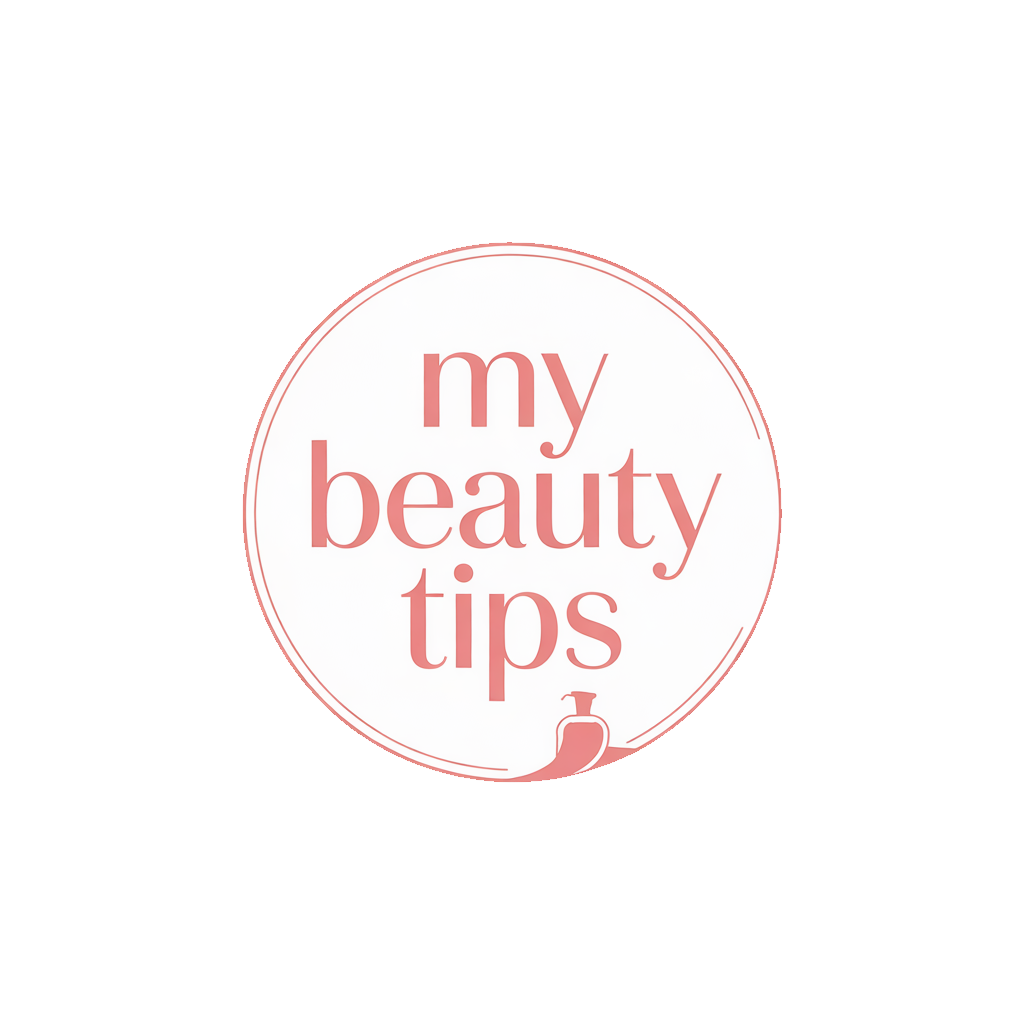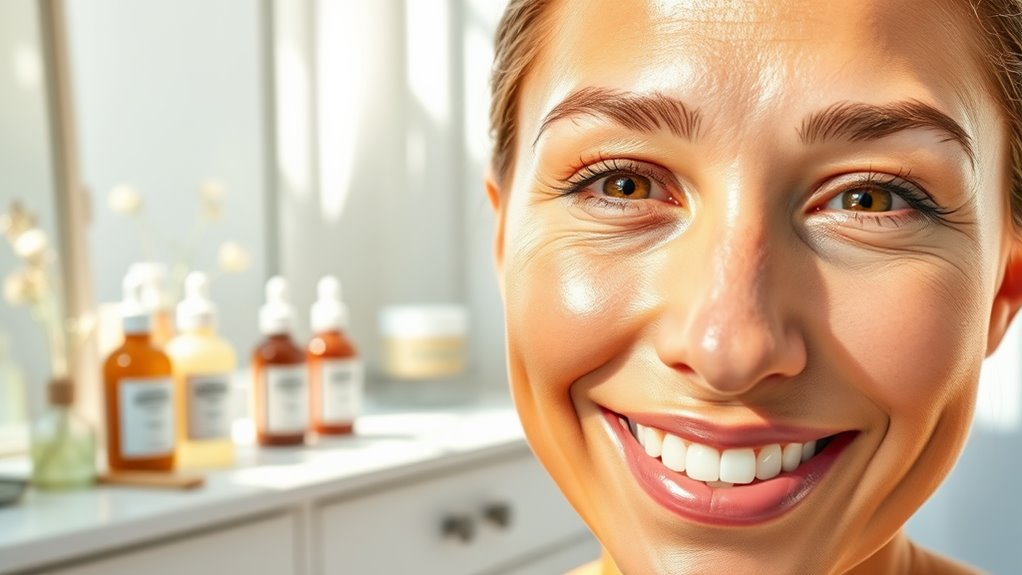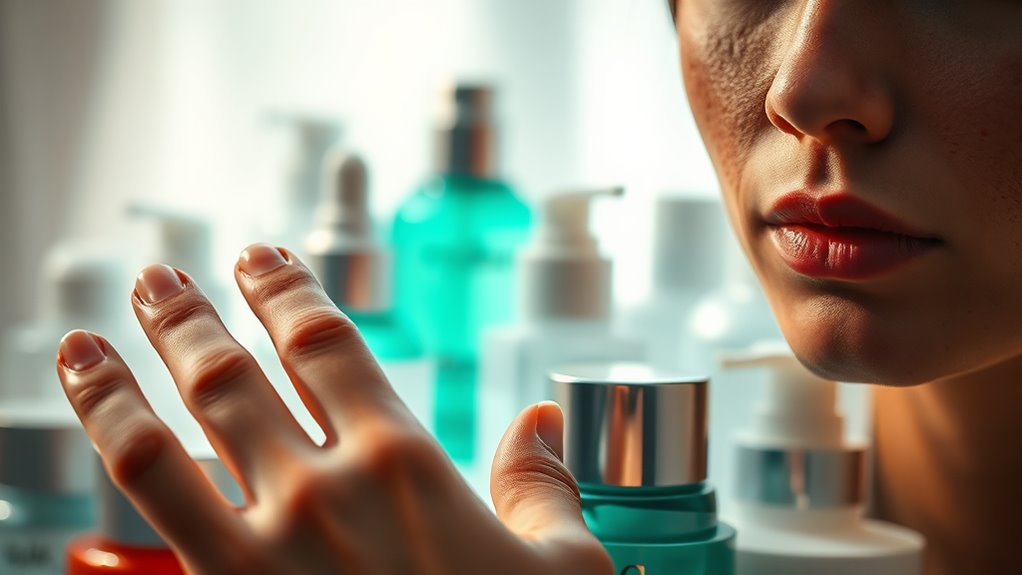How I Cleared My Acne In Just 30 Days (You Can Too)
If you’ve struggled with acne, you’re not alone. Understanding the underlying causes can empower you to take control of your skin health. In just 30 days, a structured routine involving specific treatments and lifestyle adjustments can yield significant results. By examining the science behind acne and effective solutions, you can embark on a path to clearer skin. What steps will you take to transform your skin journey?
Understanding Acne
Acne, a common skin condition, arises when hair follicles become clogged with oil and dead skin cells. This blockage creates an environment conducive to bacteria growth, resulting in inflammation and lesions.
Hormonal fluctuations, dietary factors, and stress can exacerbate this issue.
To clear acne fast, it’s essential to adopt a comprehensive skincare routine that includes gentle cleansing and non-comedogenic products.
Additionally, incorporating active ingredients like salicylic acid or benzoyl peroxide can effectively target and reduce breakouts.
Understanding your skin type and triggers is crucial in developing a personalized approach to manage and prevent acne efficiently. Quitting harsh acne products can also lead to significant improvements in skin health and overall well-being.
My Acne Journey
Reflecting on my experience with acne, I realize how it shaped my understanding of skincare and self-care.
You may find that acne often triggers a cycle of frustration and self-doubt, affecting both your emotional well-being and social interactions.
Research shows that acne isn’t merely a cosmetic issue; it’s linked to hormonal fluctuations and inflammation. Hormonal imbalances, particularly androgens and estrogen, can exacerbate acne by increasing oil production in the skin.
By experimenting with various treatments, such as topical retinoids and benzoyl peroxide, you can identify effective solutions tailored to your skin type.
Tracking your progress is essential, as it helps you understand what works and reinforces your commitment to achieving clearer skin.
Setting Realistic Goals
How can you effectively navigate your skincare journey without setting yourself up for disappointment? By establishing realistic goals, you can maintain motivation and measure progress. Evidence suggests that gradual improvements are more sustainable. Consider the following table to help clarify your expectations:
| Goal Type | Timeframe |
|---|---|
| Initial Reduction | 1-2 Weeks |
| Noticeable Improvement | 3-4 Weeks |
| Continued Progress | 1-3 Months |
| Skin Clarity Maintenance | 4-6 Months |
| Long-Term Care | Ongoing |
Incorporating consistent steps, such as achieving glass skin, can also play a significant role in your overall skincare success.
Daily Skincare Routine
Establishing a consistent daily skincare routine is crucial for acne management.
In the morning, focus on cleansing and protecting your skin, while your nighttime routine should emphasize repair and hydration.
This structured approach not only helps reduce breakouts but also promotes overall skin health. Additionally, avoiding common acne skincare mistakes can significantly enhance the effectiveness of your routine.
Morning Routine Essentials
A well-structured morning skincare routine can significantly impact your journey to clear acne in just 30 days. Start with a gentle cleanser to remove excess oil and impurities. Follow up with a toner to restore your skin’s pH balance. Next, apply a lightweight, non-comedogenic moisturizer to hydrate without clogging pores. Finally, use a broad-spectrum sunscreen to protect your skin from UV damage, which can exacerbate acne.
| Step | Purpose |
|---|---|
| Cleanser | Removes oil and impurities |
| Toner | Restores pH balance |
| Moisturizer | Hydrates skin |
| Sunscreen | Protects from UV damage |
Nighttime Skincare Steps
Your nighttime skincare routine plays a crucial role in the fight against acne, as it allows your skin to recover and repair while you sleep.
Implement these essential steps to enhance your skin’s healing process:
- Cleanser: Use a gentle, non-comedogenic cleanser to remove dirt and excess oil.
- Exfoliant: Incorporate a chemical exfoliant containing salicylic acid to unclog pores.
- Treatment: Apply targeted treatments like benzoyl peroxide or retinoids to combat acne.
- Moisturizer: Utilize a lightweight, oil-free moisturizer to maintain hydration.
- Spot Treatment: Use a spot treatment on active breakouts for localized effects.
Consistency is key for optimal results.
Choosing the Right Cleanser
How do you know if you’re using the right cleanser for your acne-prone skin?
Start by selecting a gentle, non-comedogenic formula that won’t clog your pores. Look for active ingredients like salicylic acid or benzoyl peroxide, which have been shown to reduce acne-causing bacteria and promote cell turnover.
Avoid harsh sulfates that can strip your skin’s natural barrier, leading to irritation. Ideally, choose a pH-balanced cleanser to maintain your skin’s acidity, which is crucial for healthy function. Additionally, understanding your skin type can further enhance your ability to select the most suitable cleanser for your specific needs.
Exfoliation Techniques
Exfoliation is crucial for managing acne, as it removes dead skin cells that can clog pores.
You can choose between chemical exfoliants, which promote skin cell turnover and improve texture, and physical methods, which physically scrub away impurities. Understanding the benefits of each technique will help you select the best approach for your skin type and needs. Additionally, optimal frequency of exfoliation varies by skin type, so it’s important to tailor your routine accordingly.
Chemical Exfoliants Benefits
Chemical exfoliants offer a targeted approach to improving skin texture and clarity, making them a valuable addition to any acne treatment regimen.
These agents, such as AHAs and BHAs, work by dissolving dead skin cells and unclogging pores.
Benefits include:
- Accelerated cell turnover, promoting fresh skin
- Reduction of acne scars and hyperpigmentation
- Enhanced absorption of active ingredients in other products
- Improved hydration by preventing barrier dysfunction
- Minimized inflammation, leading to fewer breakouts
Incorporating chemical exfoliants into your routine can significantly enhance your skin’s health and appearance, helping you achieve clearer skin more effectively.
Physical Exfoliation Methods
While chemical exfoliants can effectively clear away dead skin cells, physical exfoliation methods also play a significant role in maintaining a healthy complexion.
Techniques like gentle scrubs and exfoliating brushes help physically remove debris and promote cell turnover.
Using a soft cloth or sponge can enhance blood circulation, improving nutrient delivery to your skin.
Aim to exfoliate 1-2 times a week to avoid irritation.
Studies suggest that consistent physical exfoliation can reduce the appearance of acne scars and improve skin texture.
The Importance of Moisturizing
Moisturizing plays a crucial role in acne treatment, as it helps maintain the skin’s natural barrier and prevents excessive dryness.
When you moisturize, you’re not just hydrating your skin; you’re also promoting a healthier environment for healing.
Here’s why moisturizing is essential:
- Reduces inflammation and redness.
- Balances oil production, preventing clogged pores.
- Supports skin barrier function, enhancing resilience.
- Aids in the absorption of acne treatments.
- Enhances overall skin texture and appearance.
Sunscreen: Your Best Friend
Protecting your skin from harmful UV rays is just as important as keeping it hydrated.
Sunscreen acts as a barrier, preventing UV-induced skin damage, which can exacerbate acne and pigmentation issues. Research shows that UV exposure can lead to increased inflammation and hinder the healing of existing acne lesions.
By applying a broad-spectrum sunscreen with at least SPF 30 daily, you not only shield your skin from harmful rays but also promote a healthier complexion.
Remember to reapply every two hours, especially if you’re outdoors.
Incorporating sunscreen into your routine is a crucial step in maintaining clear, radiant skin.
Spot Treatments That Work
Effective spot treatments can be a game changer when it comes to managing acne breakouts.
These targeted products deliver active ingredients directly to blemishes, promoting faster healing and reducing inflammation.
Here are some proven options:
- Benzoyl Peroxide: Kills acne-causing bacteria and reduces excess oil.
- Salicylic Acid: Exfoliates pores and prevents clogging.
- Tea Tree Oil: Exhibits antimicrobial properties and reduces redness.
- Sulfur: Absorbs excess oil and calms inflammation.
- Retinoids: Accelerate skin cell turnover and prevent new breakouts.
Incorporating these treatments into your routine can lead to clearer skin in just 30 days.
The Role of Diet in Skincare
Your diet plays a crucial role in your skin’s health and can significantly impact acne development.
By identifying foods to avoid and incorporating beneficial nutrients, you can create a diet that supports clearer skin.
Understanding these dietary factors will empower you to make informed choices for your skincare routine.
Foods to Avoid
Diet plays a crucial role in skin health, particularly when it comes to managing acne.
Certain foods can trigger inflammation and hormonal fluctuations, exacerbating your condition.
To improve your skin, consider avoiding:
- Dairy products, which may increase insulin levels
- Sugary foods, known to spike blood sugar and promote inflammation
- Processed foods, often high in unhealthy fats and preservatives
- Refined carbohydrates, which can lead to insulin resistance
- High-glycemic index foods, linked to increased acne breakouts
Beneficial Nutrients for Skin
What nutrients are essential for promoting healthy skin and combating acne?
Omega-3 fatty acids, found in fish and walnuts, reduce inflammation and improve skin barrier function.
Antioxidants like vitamins A, C, and E help combat oxidative stress, promoting healing and cell regeneration.
Zinc, present in legumes and nuts, plays a crucial role in regulating oil production and reducing inflammation.
Additionally, hydration is vital; drinking plenty of water helps maintain skin elasticity and clarity.
Incorporating these nutrients into your diet can significantly enhance your skin’s health, reducing acne and promoting a clearer complexion.
Prioritize these elements for optimal results.
Foods to Avoid
Certain foods can exacerbate acne, making it crucial to identify and avoid them for clearer skin.
Research suggests that high-glycemic foods may increase insulin levels, which can trigger oil production and inflammation.
Similarly, dairy products are linked to acne due to hormones present in milk.
Consider avoiding the following:
- Sugary snacks and beverages
- White bread and pasta
- Processed foods high in trans fats
- Dairy products, especially skim milk
- Fast food and fried items
Foods to Embrace
Are you ready to transform your diet for clearer skin? Embracing certain foods can significantly improve your skin health. Focus on incorporating nutrient-rich options that reduce inflammation and support skin repair.
| Food | Benefits | Examples |
|---|---|---|
| Fruits | High in antioxidants | Berries, oranges |
| Vegetables | Rich in vitamins and minerals | Spinach, carrots |
| Whole Grains | Stabilize blood sugar | Quinoa, brown rice |
| Omega-3 Fatty Acids | Reduce inflammation | Salmon, walnuts |
| Probiotics | Support gut health | Yogurt, kefir |
Including these foods can enhance your journey toward clearer skin.
Hydration and Its Benefits
Hydration plays a crucial role in maintaining skin health, directly impacting your acne condition.
When you drink enough water, you help your body flush out toxins and keep your skin moisturized, reducing the likelihood of breakouts.
Let’s explore the importance of water intake and practical tips to ensure you stay properly hydrated.
Importance of Water Intake
How can something as simple as water have such a profound impact on your skin?
Adequate hydration is essential for optimal skin function, aiding in detoxification and maintaining elasticity.
When you drink enough water, you support your body’s natural processes, which can lead to clearer skin.
- Flushes out toxins
- Regulates oil production
- Enhances nutrient delivery to skin cells
- Supports cellular repair and regeneration
- Reduces inflammation and redness
Hydration and Skin Health
What role does hydration play in maintaining healthy skin?
Adequate hydration is crucial for preserving skin elasticity, preventing dryness, and reducing the appearance of fine lines.
Water helps to flush toxins from your body, which can decrease acne flare-ups.
Research shows that well-hydrated skin retains moisture and has a better barrier function, reducing trans-epidermal water loss.
This promotes a healthier complexion and aids in the skin’s natural healing processes.
Additionally, proper hydration improves blood circulation, delivering essential nutrients to skin cells.
Tips for Staying Hydrated
Staying adequately hydrated is essential for maintaining optimal skin health and preventing acne flare-ups.
When you drink enough water, your skin can better regulate oil production, reduce inflammation, and flush out toxins.
Here are some practical tips to help you stay hydrated:
- Aim for at least 8 glasses of water daily.
- Incorporate hydrating foods like cucumbers, oranges, and watermelon.
- Set reminders on your phone to drink water throughout the day.
- Carry a reusable water bottle to track your intake.
- Limit caffeine and alcohol, as they can dehydrate your body.
With consistent hydration, you can support your skin’s health effectively.
Supplements for Skin Health
Could incorporating specific supplements into your daily routine enhance your skin health?
Research suggests that vitamins A, C, and E play vital roles in skin repair and protection.
Omega-3 fatty acids can reduce inflammation, which may help minimize acne breakouts.
Zinc has been shown to regulate oil production and support wound healing.
Additionally, probiotics may improve gut health, which is linked to skin conditions.
Before starting any supplement, it’s essential to consult with a healthcare professional to ensure compatibility with your individual health needs.
The Impact of Sleep on Skin
Sleep plays a crucial role in skin healing and regeneration, impacting your overall skin health.
When you get adequate rest, your body maintains hormonal balance, which can directly influence acne development.
Prioritizing quality sleep can be one of the most effective strategies for achieving clearer skin.
Sleep’s Role in Healing
How essential is quality sleep for your skin’s health?
Sleep plays a crucial role in skin repair and regeneration.
During deep sleep, your body produces growth hormones, which aid in cell turnover, crucial for healing acne.
Insufficient sleep can lead to increased inflammation and stress hormones, exacerbating skin issues.
To optimize your skin’s condition, focus on the following:
- Enhanced blood flow to the skin
- Improved barrier function for moisture retention
- Regulation of sebum production
- Reduction of dark circles and puffiness
- Boosted immune response to fight bacteria
Prioritizing sleep can significantly enhance your skin’s healing process.
Hormonal Balance and Sleep
What happens to your hormonal balance when you skimp on sleep?
Insufficient sleep disrupts the production of essential hormones like cortisol and insulin, leading to increased inflammation and oil production in your skin.
Elevated cortisol levels can trigger acne flare-ups by overstimulating sebaceous glands.
Moreover, sleep deprivation can diminish your body’s ability to regulate hormones related to stress and appetite, further complicating skin health.
Prioritizing quality sleep not only stabilizes hormonal fluctuations but also enhances your skin’s healing processes.
Stress Management Techniques
Why do stress management techniques matter in your journey to clear acne?
Stress triggers hormone production, leading to increased oil production and inflammation—key contributors to acne.
By managing stress effectively, you can minimize these effects and promote clearer skin.
Consider these evidence-based techniques:
- Mindfulness meditation: Reduces cortisol levels and promotes relaxation.
- Deep breathing exercises: Lowers anxiety, enabling better emotional regulation.
- Time management: Prevents overwhelm and helps maintain balance.
- Social support: Strengthens connections, providing emotional resilience.
- Journaling: Encourages processing thoughts and feelings, reducing stress.
Incorporate these techniques to support your skin health journey.
Exercise and Its Effects on Acne
Exercise plays a crucial role in managing acne by promoting overall skin health and hormonal balance.
Engaging in regular physical activity increases blood circulation, delivering essential nutrients to your skin while aiding in the removal of toxins.
Additionally, exercise helps reduce inflammation, which can exacerbate acne.
Studies suggest that moderate exercise may also help regulate sebum production, decreasing the likelihood of clogged pores.
Furthermore, sweating can assist in clearing out impurities from the skin.
The Influence of Hormones
Hormones significantly influence acne development, particularly during puberty, menstruation, and times of stress.
Understanding this relationship can empower you to manage your skin more effectively.
- Elevated androgens increase oil production, clogging pores.
- Fluctuating estrogen levels can exacerbate skin issues during your menstrual cycle.
- Stress hormones, like cortisol, can trigger inflammation and acne flare-ups.
- Insulin resistance may lead to increased sebum production and acne severity.
- Hormonal therapies, such as birth control, can help regulate outbreaks.
Understanding Triggers
Identifying what triggers your acne can be a game-changer in your skincare routine.
Common triggers include hormonal fluctuations, stress, diet, and environmental factors.
Research indicates that high-glycemic foods and dairy may exacerbate acne by promoting inflammation and sebum production.
Stress activates adrenal glands, leading to increased oil production, while inadequate sleep can impair your skin’s healing process.
Additionally, environmental pollutants can irritate your skin, contributing to breakouts.
By understanding these triggers, you can tailor your approach, reduce flare-ups, and ultimately achieve clearer skin.
Awareness is key; knowing your triggers empowers you to make informed choices for healthier skin.
Keeping a Skincare Journal
Keeping a skincare journal can significantly enhance your understanding of what works for your skin.
By documenting your routine, you can identify patterns and make informed adjustments.
Here’s what to track:
- Products Used: Note each product’s ingredients and purpose.
- Skin Reactions: Record any immediate or delayed reactions.
- Dietary Changes: Observe how your diet impacts your skin.
- Environmental Factors: Consider changes in weather or pollution.
- Emotional State: Reflect on stress levels and their effects on your skin.
This systematic approach provides evidence that can guide you toward achieving clearer skin in just 30 days.
The Power of Consistency
Consistency in your skincare routine is a key factor in achieving clearer skin.
Regular application of products, like cleansers and treatments, maintains the skin’s barrier function and prevents acne flare-ups.
Studies show that adherence to a routine enhances the efficacy of active ingredients such as salicylic acid and benzoyl peroxide.
Additionally, a steady approach allows your skin to adapt, minimizing irritation and promoting healing.
Skipping steps or frequently changing products can disrupt this process, leading to inconsistent results.
Commit to your routine daily, and you’ll likely observe significant improvements within 30 days, transforming your skin health effectively and sustainably.
Evaluating Your Progress
How can you effectively measure the progress of your acne treatment?
Regular evaluation is essential for understanding what’s working.
Consider these methods:
- Photographic documentation: Take weekly photos to visually track changes.
- Skin journal: Record daily skin condition, product use, and any flare-ups.
- Symptom assessment: Rate the severity of your acne on a scale from 1 to 10.
- Treatment adherence: Note how consistently you’re following your routine.
- Consultation feedback: Regularly check in with a dermatologist for professional insights.
These strategies will provide you with an objective framework to gauge your progress and make informed decisions.
Adjusting Your Routine
Adjusting your routine is crucial for optimizing acne treatment and achieving clearer skin. Regularly evaluate your skincare products and lifestyle factors, as they can significantly impact your progress. Consider the following adjustments based on your skin’s response:
| Factor | Recommendation | Notes |
|---|---|---|
| Cleanser | Use a gentle cleanser | Avoid harsh scrubs |
| Moisturizer | Opt for oil-free | Prevents clogged pores |
| Exfoliation Frequency | Twice a week | Reduces dead skin buildup |
| Diet | Reduce sugar intake | May decrease inflammation |
| Hydration | Drink plenty of water | Supports skin health |
Tailor your routine to meet your skin’s needs effectively.
Seeking Professional Help
Even with a well-tailored skincare routine, some individuals may find that professional intervention is necessary to achieve clearer skin.
Consulting a dermatologist can provide you with targeted treatments and expert advice.
They can assess your skin type, prescribe medications, or suggest advanced therapies tailored to your specific needs.
- Prescription topicals (e.g., retinoids, antibiotics)
- Oral medications (e.g., isotretinoin, hormonal treatments)
- Chemical peels for deeper exfoliation
- Laser therapy to reduce inflammation and scarring
- Personalized skincare regimens based on clinical evaluation
Taking this step can significantly expedite your journey to clearer skin and boost your confidence.
Natural Remedies That Help
Natural remedies can play a significant role in managing acne effectively.
Herbal treatments have shown promise in reducing inflammation and bacteria, while a balanced diet can support overall skin health.
Herbal Treatments for Acne
Herbal treatments for acne offer a promising alternative for those seeking natural remedies to manage their skin condition.
Research indicates that certain herbs possess anti-inflammatory and antimicrobial properties, which can help reduce acne severity.
Consider incorporating these herbal options into your regimen:
- Tea Tree Oil: Known for its antibacterial effects, it can reduce inflammation.
- Green Tea Extract: Rich in antioxidants, it may lower sebum production.
- Aloe Vera: Contains soothing compounds that help heal and hydrate skin.
- Lavender Oil: Can reduce stress-related breakouts through its calming effect.
- Turmeric: Its anti-inflammatory properties may help clear skin.
Explore these options to find what works best for you.
Diet and Skin Health
How does your diet influence your skin health?
Research shows that consuming a diet rich in antioxidants, vitamins, and healthy fats can significantly improve your skin’s appearance.
Foods high in omega-3 fatty acids, like salmon and walnuts, help reduce inflammation, while fruits and vegetables provide essential nutrients that support skin repair.
Conversely, diets high in refined sugars and dairy may exacerbate acne symptoms.
Incorporating whole foods, such as leafy greens and berries, can promote a balanced microbiome, essential for skin health.
Makeup Tips for Acne-Prone Skin
When it comes to managing acne-prone skin, choosing the right makeup products and application techniques can make a significant difference in your skin’s health.
Here are some essential tips to consider:
- Opt for non-comedogenic products that won’t clog your pores.
- Choose oil-free foundations and concealers to reduce excess oil.
- Use a silicone-based primer to create a smooth base and minimize the appearance of blemishes.
- Apply makeup with clean brushes or sponges to avoid bacteria transfer.
- Set your makeup with a mineral-based powder to absorb excess oil without irritating your skin.
These strategies can help you maintain clearer skin while enhancing your beauty.
Building Confidence During Treatment
Why is it crucial to build confidence during acne treatment?
Confidence plays a significant role in psychological well-being, influencing stress levels and self-esteem.
Research shows that individuals with acne often face social anxiety and depression, impacting their quality of life.
By focusing on self-acceptance and maintaining a positive mindset, you can improve your emotional resilience.
Engaging in supportive communities and seeking professional guidance can foster a sense of belonging and understanding.
Additionally, practicing self-care routines, like mindfulness or exercise, helps reinforce your self-worth.
Celebrating Small Wins
Tracking your daily progress is essential in managing acne, as it allows you to pinpoint improvements and setbacks.
Recognizing milestones, both in your skin’s condition and other aspects of your life, can boost your motivation.
Celebrating these small wins plays a crucial role in maintaining a positive mindset throughout your treatment journey.
Daily Progress Tracking
Regularly monitoring your skin’s progress can significantly enhance your acne treatment journey.
By tracking daily changes, you can identify patterns and reactions to treatments, which helps refine your regimen.
Celebrate small wins to maintain motivation and commitment.
- Notice slight reductions in redness or swelling.
- Document any new products that work effectively.
- Recognize improvements in skin texture.
- Celebrate days without breakouts.
- Reflect on emotional and psychological benefits of clearer skin.
These observations provide tangible evidence of progress, fostering a positive mindset and empowering you to continue your journey toward clearer skin.
Recognizing Improvement Milestones
Have you noticed subtle changes in your skin that signal progress in your acne treatment?
These improvements can include reduced redness, fewer active breakouts, or smaller pore sizes.
Recognizing these milestones is essential for maintaining motivation and reinforcing your commitment to the regimen.
Research shows that acknowledging small wins leads to increased adherence to treatment protocols.
Documenting these improvements can help you visualize your journey and identify effective strategies.
By celebrating each milestone, you not only boost your confidence but also create a positive feedback loop that encourages sustained effort and resilience in combating acne.
Keep tracking and celebrating those victories!
Celebrating Non-Acne Achievements
Why focus solely on acne when there are numerous other achievements worth celebrating?
Acknowledging your progress in various aspects of life can enhance motivation and overall well-being.
Celebrating small wins can also boost your self-esteem, proving that positive changes extend beyond skin.
- Improved hydration habits
- Consistent skincare routine
- Increased physical activity
- Better sleep quality
- Enhanced dietary choices
Recognizing these successes fosters a holistic approach to health.
Maintaining Clear Skin Long-Term
While achieving clear skin in 30 days is an attainable goal, maintaining that clarity long-term requires ongoing commitment and a well-structured skincare regimen.
You should continue using non-comedogenic products and incorporate active ingredients like salicylic acid or retinoids, which have proven efficacy in preventing breakouts.
Regularly exfoliating can help remove dead skin cells, while hydration supports skin barrier function.
Additionally, protecting your skin from UV exposure is crucial, as sun damage can trigger inflammation.
Lastly, monitor your diet and stress levels, as both can significantly impact your skin health.
Consistency is key; your efforts will pay off in the long run.
Inspiring Others on Their Journey
Sharing your journey to clear skin can inspire others facing similar challenges.
Your story not only highlights the struggles but also showcases the possibility of transformation.
By sharing your experience, you can foster a sense of community and provide hope.
- Highlight the importance of consistency in skincare routines.
- Emphasize the role of diet and hydration in skin health.
- Encourage seeking professional advice for personalized treatment plans.
- Share coping strategies for mental well-being during the process.
- Celebrate small victories to motivate others on their journey.
Your insights can empower those battling acne to take actionable steps toward clear skin.





